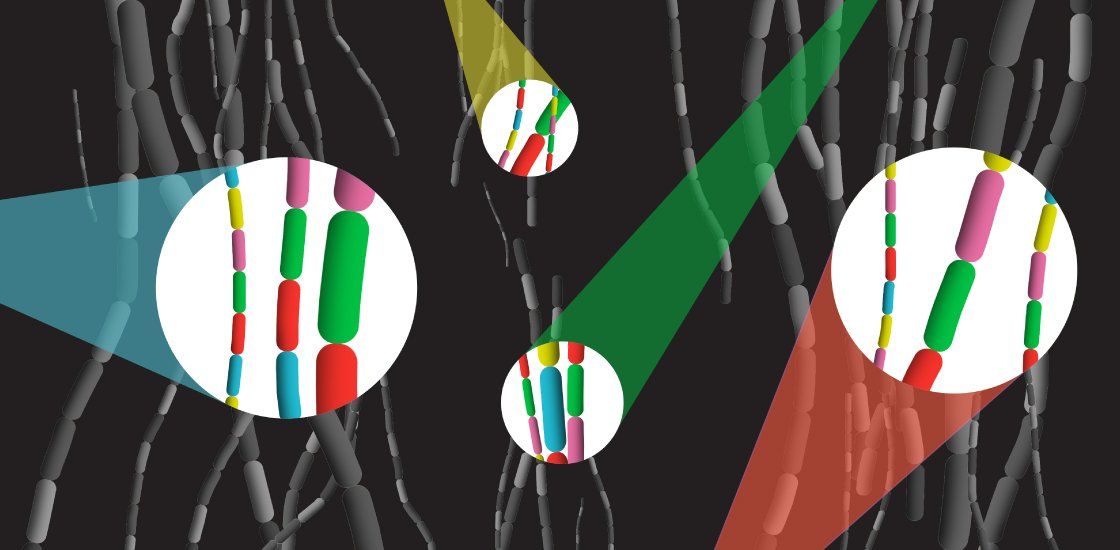Clues to Treatment of Schizophrenia and Bipolar Disorder Found in Recently Evolved Region of the ‘Dark Genome’

Scientists investigating the DNA outside our genes - the 'dark genome' - have discovered recently evolved regions that code for proteins associated with schizophrenia and bipolar disorder.
They say these new proteins can be used as biological indicators to distinguish between the two conditions, and to identify patients more prone to psychosis or suicide.
Schizophrenia and bipolar disorder are debilitating mental disorders that are hard to diagnose and treat. Despite being amongst the most heritable mental health disorders, very few clues to their cause have been found in the sections of our DNA known as genes.
The scientists think that hotspots in the 'dark genome' associated with the disorders may have evolved because they have beneficial functions in human development, but their disruption by environmental factors leads to susceptibility to, or development of, schizophrenia or bipolar disorder.
The results are published today in the journal Molecular Psychiatry.
"By scanning through the entire genome we've found regions, not classed as genes in the traditional sense, which create proteins that appear to be associated with schizophrenia and bipolar disorder," said Dr Sudhakaran Prabakaran, who was based in the University of Cambridge's Department of Genetics when he conducted the research, and is senior author of the report.
He added: "This opens up huge potential for new druggable targets. It's really exciting because nobody has ever looked beyond the genes for clues to understanding and treating these conditions before."
The researchers think that these genomic components of schizophrenia and bipolar disorder are specific to humans -- the newly discovered regions are not found in the genomes of other vertebrates. It is likely that the regions evolved quickly in humans as our cognitive abilities developed, but they are easily disrupted -- resulting in the two conditions.
"The traditional definition of a gene is too conservative, and it has diverted scientists away from exploring the function of the rest of the genome," said Chaitanya Erady, a researcher in the University of Cambridge's Department of Genetics and first author of the study.
She added: "When we look outside the regions of DNA classed as genes, we see that the entire human genome has the ability to make proteins, not just the genes. We've found new proteins that are involved in biological processes and are dysfunctional in disorders like schizophrenia and bipolar disorder."
The majority of currently available drugs are designed to target proteins coded by genes. The new finding helps to explain why schizophrenia and bipolar disorder are heritable conditions, and could provide new targets for future treatments.
Schizophrenia is a severe, long-term mental health condition that may result in hallucinations, delusions, and disordered thinking and behaviour, while bipolar disorder causes extreme mood swings ranging from mania to depression. The symptoms sometimes make the two disorders difficult to tell apart.
Prabakaran left his University position earlier this year to create the company NonExomics, in order to commercialise this and other discoveries. Cambridge Enterprise, the commercialisation arm of the University of Cambridge, has assisted NonExomics by licensing the intellectual property. Prabakaran has raised seed funding to develop new therapeutics that will target the proteins implicated in schizophrenia and bipolar disorder, and other diseases.
His team has now discovered 248,000 regions of DNA outside of the regions conventionally defined as genes, which code for new proteins that are disrupted in disease.
This article originally posted at Science Daily.
Materials provided by University of Cambridge. The original text of this story is licensed under a Creative Commons License. Note: Content may be edited for style and length.
Orange County Psychiatric Associates, in Mission Viejo, works with adolescents, and adults to enable them to live their lives to their fullest. Orange Coast Psychiatric Associates tailors treatments based on the understanding that both body and mind must be treated in order to promote better mental and physical health. Let us help you improve your quality of life with specialized care for you.




